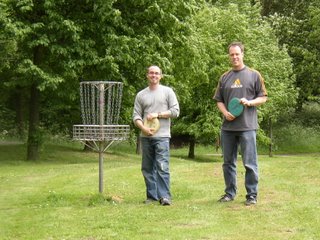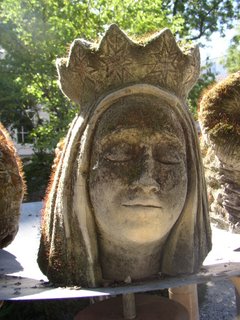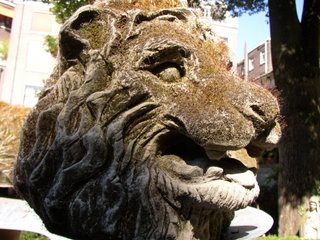[Marci and I enjoyed a truly unique -- and truly bizarre -- evening in Amsterdam's Vondelpark last week. But... to do justice to the experience, I wanted to try painting with smaller strokes and a more varied pallette in my writing. But... realizing that the blogging format is not ideally suited for longer blocks of text, I wanted to try a different publishing strategy: a serial. But... the success of this strategy -- and your enjoyment of these posts -- depends on your willingness to follow along. See Summer Shostakovich (Part One),
Summer Shostakovich (Part Two), and Summer Shostakovich (Part Three) to catch up and join the adventure...]
* * * * *
...Soon after the feather silently touched down inside the piano, the audience loudly erupted in applause -- not for the feather, of course, but for the conclusion of Shostakovich's piano ballet for the glory of Soviet soccer. After an impersonal bow to the audience, the pianist presented his arms to the side, in the manner of a Spanish toreador, as a graceful woman in a simple black dress took to the stage with her cello. He offered a brief introduction. They took their seats. She needed a bit of tuning. Then the duet began to play.
To speak succinctly: it was glorious. The rich sweet resonance of the cello swelled through the amphitheater and made me feel like crying, or sighing, or flying with the parrots of the Vondelpark.
De Kamer van Sjostakovitj gave me a place to live and remember everything good and beautiful about life in Amsterdam: beautiful public spaces, appreciation of the fine arts, creative self-expression, a broad network of intelligent, cultured people...
It was then that I noticed the woman in red.
All evening, she had been obviously and ecstatically enjoying the music. Her bespectacled husband was a bit more reserved, befitting his earth-toned three-piece suit and in marked contrast to her red-dressed exhuberance. As the musicians performed just meters beyond their front-row seats, he would pat her arm in a tactile communication of love and consideration. In a reserved, earth-toned way of course. But she would smile freely and sway gently, maybe even humming along to the music at times -- soaking, seeping, savoring the music in a fresh red way that seemed decades younger than her gray hair and laughlines would suggest. When the music had reached its point of saturation -- somewhere in the middle of the duet's second number -- it seemed she could contain herself no longer. Instantaneously, though not inconspicuously, she rose to her feet and began to dance.
My heart was summoned by the romance of the moment. I wanted to pull Marci closer, forget the crowd of strangers, and push the collapsable chairs aside to create a dance floor for us. And for the silver-haired lady in red. And her reluctant-though-raptured gentleman escort...
But because my feet are slower than my mind -- and because of another brief flash of the foreigner's flu -- I did no such thing. Instead, for a moment longer, I watched the red dame dance, and suddenly I felt a flush of vicarious shame that ravenously swallowed my sense of grandeur and romance. As I watched, I could see that her dance was not the waltz. Nor the foxtrot -- nor whatever sort of ballroom dance would be appropriate for a Shostakovich concerto. Rather, her dance was a clumsy two-step -- slightly off-balance and decidedly unbecoming a lady of her age and stature. Her elbows were cocked at her sides; she shimmied from left to reft in a poor impersonation of MC Hammer. She tried to pull at her husband, to coax him into dancing with her; but he sat stolidly in his seat, and I subconsciously sunk deeper and deeper into my chair with empathic embarrassment for them both.
Apparently, the red-dressed, silver-tressed lady's demonstrative joy throughout the evening had not been the result of stirred sentimentality (as I had previously assumed), but rather a painfully open succumbence to senility.
As others in the audience started to notice the spectacle, they would alternatively stare and divert their gaze. The scene was simultaneously compelling and repulsing -- like a slow-motion instant replay of a horrific sporting injury or a low-budget made-for-television movie. Most folks did their best to be polite. To not point and stare, to not let on that they had seen this private peculiarity. But when the red dancer attempted an awkward twirl that nearly broke my heart and her ankles, a nearby guffaw broke the code of respectability.
Someone was laughing.
It was the flaming sailor, just a couple of rows in front of me. His pink bangles and beads shook with laughter and accusation, hysterically mocking this woman dancing under the influence of Alzheimers. He made no attempts at discretion. And while other strangers cast him rude looks or deliberately ignored the scenario, the woman sitting next to the sailor started twittering as well. They looked at each other -- like fourth-grade girlfriends -- and their giggling escalated, unchecked. When the lady in red let loose another clumsy twirl, their shockwave of laughter became momentarily audible, even from several meters away. The woman sitting beside us quietly tsked, her dog perked its head curiously, and I was ignited with indignation.
As we all painfully watched, the dancing
mevrouw returned to her regretful
man and beligerantly pouted when he again refused her invitation to the ballroom of her dementia. She gave a half-hearted effort toward a few further dance moves but then wandered off toward stage left where the amphitheater shell ended and the wooded regions of the park began. As she quickly disappeared into the thicket, her gentleman husband patiently gathered himself, straightened on the lapels of his suitcoat, and casually strolled after her as if to reluctantly settle a lovers' spat. I felt sad for him. And for her.
But my primary emotion upon their departure was anger. Fury, even. The juvenile mockers' gulps and giggling gradually subsided to stupid grins. Yet my outrage escalated as time went on. I was incredulous at the insensitivity of these strangers! Particularly the gay sailor! This man wore his alternative sexuality on his shirt sleeve (and around his neck, and on top of his head, and upon his feet) -- a seemingly open invitation to mockery from the straight world -- still he had the audacity to publicly disparage those whom he might judge freakish... Oh...
An epiphany... I flashed back to my snap judgments of the ugly dogs, the Orneüs Trio, our waiters from dinner earlier in the evening... And I realized that I hadn't really taken notice of anyone that day who was significantly smarter than me. Or more fashionable. Or handsomer. Or wiser. Or who had any more admirable qualities whatsoever. Instead, I had been climbing on the backs of strangers to get the highest view of the world. To secretly laugh at the "freaks" around me who could provide reassurance that I was "normal" and likeable. To pass judgment on those worth or unworthy of my consideration.
As the evening air grew cool, the park no longer bathed in the indandescent rays of the setting sun, I pulled close to Marci and asked if she was ready to leave. I'd had enough.













